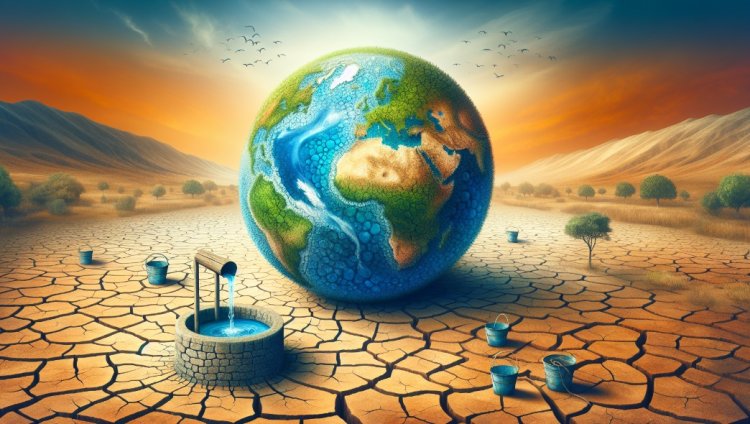The Looming Water Crisis: When Our Wells Run Dry
"Examine the critical global issue of the looming water crisis in 'When Our Wells Run Dry.' This article explores the causes, consequences, and potential solutions to the urgent problem of water scarcity, highlighting the impact on communities, economies, and ecosystems worldwide."

Introduction
Water scarcity is a pressing global issue that demands our immediate attention. As water sources around the world continue to dry up, we face potential consequences that could be devastating for both human survival and that of the planet. Water is an essential resource that we rely on for drinking, sanitation, agriculture, and numerous other vital functions. Without access to clean water, societies cannot thrive, and conflicts over water resources become inevitable.
Humankind's approach to water has been potentially lethal, with our increasing demands and unsustainable practices. As climate change exacerbates water scarcity, the situation becomes even more dire. Rising temperatures, changing rainfall patterns, and prolonged droughts contribute to the depletion of water sources worldwide. We are witnessing the lethal implications of our actions and must take immediate action to mitigate the impact.
The consequences of a water crisis are far-reaching. Societies will face water shortages, leading to health and safety emergencies. Businesses that rely on water will struggle to operate, and communities will be forced to implement extreme measures to conserve water. Moreover, the lack of water will result in mass migrations as people search for areas with more accessible water sources.
It is crucial to understand that water scarcity is not just a regional issue. It is a global crisis that affects us all. We must come together to address the root causes of water scarcity and take steps to ensure a sustainable and equitable future for everyone. In the following sections, we will explore the dire implications of water scarcity and delve into the impact of climate change on this pressing issue.
Water Crisis in Avila Beach, California
Avila Beach, a picturesque resort town in southern California, is currently facing a severe water crisis. The impact of drought on this coastal paradise has been devastating, with the land behind the coast now eerily barren. The situation is only expected to worsen, with Avila Beach and most places in California projected to run out of water.
As a result, the town has declared a state of emergency and is heavily reliant on trucked water. The ongoing drought has led to a shutdown of the local water supply, causing panic and uncertainty for the community. Businesses, including restaurants and cafes, are struggling to operate due to the limited water supply. Some have even had to lock their bathrooms to the public, posing health and safety risks.
Local business owners, like Massimo Melani, who owns a restaurant in Avila Beach, are feeling the consequences of the water crisis. They are reliant on government-provided rationed water, which is insufficient to meet the demands of their businesses. The situation has become an embarrassment, a source of fear, and a cause for reevaluation of their lives and livelihoods.
The water scarcity not only affects the local community but also poses challenges for the entire region. Avila Beach is just one example of how climate change and unsustainable water practices can lead to dire consequences. The reliance on long-distance pipelines and trucked water is not a sustainable solution and highlights the need for innovative and long-term water management strategies.
The water crisis at Avila Beach serves as a wake-up call for the rest of the world. It highlights the urgent need for action to address water scarcity, both locally and globally. Without access to clean water, communities cannot thrive, businesses struggle to operate, and conflicts over water resources become inevitable. We must come together to find sustainable solutions and ensure a future where water is accessible to all.
Water Crisis in Mendocino, California
Water scarcity is a pressing issue that affects communities worldwide. Even in water-rich regions like northern California, the looming water crisis is a growing concern. Mendocino, a town located on the cliffs overlooking the ocean, is currently facing the devastating effects of a severe drought.
Traditionally known for its picturesque beauty and popular tourist destinations, Mendocino has been heavily reliant on trucked water since January. However, the situation took a turn for the worse on July 18th when Fort Bragg, a nearby town, shut off the tap, leaving Mendocino with no local water supply. The town declared a state of emergency, and panic and uncertainty quickly set in among the community.
The dependence on trucked water has had a significant impact on the town's local industry and economy. Businesses, including restaurants and cafes, are struggling to operate due to the limited water supply. Some establishments have even had to lock their bathrooms to the public, posing health and safety risks. The situation has become an embarrassment and a cause for reevaluation of their lives and livelihoods for business owners like Massimo Melani.
The water crisis not only affects the local community but also poses challenges for the entire region. The reliance on long-distance pipelines and trucked water is not a sustainable solution. It highlights the need for innovative and long-term water management strategies. Without access to clean water, communities cannot thrive, businesses struggle to operate, and conflicts over water resources become inevitable.
Health and safety concerns are also at the forefront of the crisis in Mendocino. The limited water supply has led to the implementation of extreme measures, such as setting up portable toilets throughout the town. The lack of continuous access to water is not only difficult but also poses significant risks to the well-being of the community.
The water crisis in Mendocino serves as a wake-up call for the rest of the world. It highlights the urgent need for action to address water scarcity, both locally and globally. The town is facing the challenges of adapting to a rapidly changing climate and finding sustainable solutions to ensure a future where water is accessible to all.
Water Crisis in Germany
Even in water-rich regions like Germany, water scarcity is becoming a pressing issue. Searing temperatures in some parts of the country have led to water shortages, posing a significant risk to the drinking water supply.
The depletion of groundwater due to extended periods of drought has had a direct impact on water availability. Groundwater levels have been steadily dropping, with measurements showing a significant decrease over the past decade. In some areas, groundwater levels have dropped by as much as 13 meters since 2012.
The consequences of groundwater depletion are already visible, with wells being closed due to the lack of water. For example, a well in Teuschnitz, Bavaria, that has supplied drinking water to over 200 households for more than a century will no longer be able to meet the demand. This highlights the urgent need for alternative water sources and long-term water management strategies.
The challenges posed by climate change and water scarcity in Germany are undeniable. The increasing frequency of dry summers and the delayed replenishment of groundwater reserves have put immense pressure on the water supply. As a result, searing temperatures have repeatedly strained drinking water supplies, leading to the occasional interruption in the supply.
The closure of wells and the reliance on long-distance pipelines from dams, such as the Mauthaus Dam, are temporary solutions that cannot guarantee a sustainable water supply. The current situation calls for innovative approaches and long-term strategies to ensure water availability for both current and future generations.
It is crucial to address the root causes of water scarcity and take immediate action to mitigate the impact. The challenges faced in Germany should serve as a wake-up call for the rest of the world. Water scarcity is a global crisis that affects us all, and it requires a collaborative effort to find sustainable solutions.
The Future Implications and Global Migration
Water scarcity not only poses immediate challenges but also has long-term implications for global migration patterns and international relations. As water sources continue to dry up, the potential for mass migrations due to water scarcity becomes a real possibility. Here are some important points to consider:
-
The potential for global migration due to water scarcity: As regions experience severe water scarcity, people may be forced to relocate in search of areas with more accessible water sources. This can lead to significant population movements, both within countries and across borders.
-
The movement of populations in response to changing climate zones: Climate change is altering weather patterns and contributing to the shifting of climate zones. As certain areas become more arid and inhospitable, people may be compelled to migrate to regions with more favourable conditions, including access to water.
-
The historical and current conflicts over water resources: Throughout history, conflicts have arisen over control and access to water resources. As water scarcity intensifies, these conflicts may become more frequent and more severe. Disputes over shared water sources can strain international relations and potentially lead to armed conflicts.
-
The impact of water scarcity on international relations: Water scarcity can strain diplomatic relations between countries that share water resources. Disagreements over water allocation and management can escalate tensions and create geopolitical challenges. Cooperation and negotiation are crucial to prevent conflicts and ensure equitable access to water.
-
The need for urgent action and prioritisation of water issues: Given the dire implications of water scarcity, urgent action is needed to address this global crisis. Governments, organisations, and communities must prioritise water management, conservation, and sustainable practices. Investing in innovative technologies and long-term water management strategies is crucial to mitigating the impact of water scarcity and preventing future conflicts.
It is crucial to recognise that water scarcity is not just a regional concern; it is a global issue that affects us all. The potential for mass migrations, conflicts over water resources, and strained international relations necessitate immediate attention and action. By prioritising water issues and working collaboratively, we can ensure a sustainable and equitable future where water is accessible to all.
Conclusion: The Urgency for Change
The looming water crisis demands immediate attention and action. Water scarcity is a pressing global issue that affects us all, and the consequences of inaction could be devastating for human survival and the planet. We must prioritise water issues and work towards a sustainable and equitable future where water is accessible to all.
First and foremost, awareness about water scarcity is essential. We must educate ourselves and others about the severity of the problem and the urgent need for action. Water is an essential resource that we rely on for drinking, sanitation, agriculture, and countless other vital functions. Without access to clean water, societies cannot thrive, and conflicts over water resources become inevitable.
Water conservation and sustainable water management are paramount. We must implement practices that reduce water consumption, such as fixing leaks, using water-efficient appliances, and practicing responsible irrigation methods. Additionally, we need to invest in innovative technologies for water treatment, desalination, and efficient water use.
Governments and decision-makers play a crucial role in addressing the water crisis. They must prioritise water issues on political agendas and allocate resources towards sustainable water management strategies. Collaboration between governments, organisations, and communities is crucial to finding solutions that ensure equitable access to water and prevent future conflicts.
The potential consequences of inaction are dire. Societies will face water shortages, leading to health and safety emergencies. Businesses that rely on water will struggle to operate, and communities will be forced to implement extreme measures to conserve water. Moreover, the lack of water will result in mass migrations as people search for areas with more accessible water sources. These migrations can strain resources and lead to geopolitical challenges.
The urgency for change regarding the water crisis cannot be overstated. Water scarcity is a global crisis that affects us all. We must come together, raise awareness, take action, and prioritise water issues on political agendas. By doing so, we can ensure a sustainable and equitable future where water is accessible to all.



 admin
admin 










